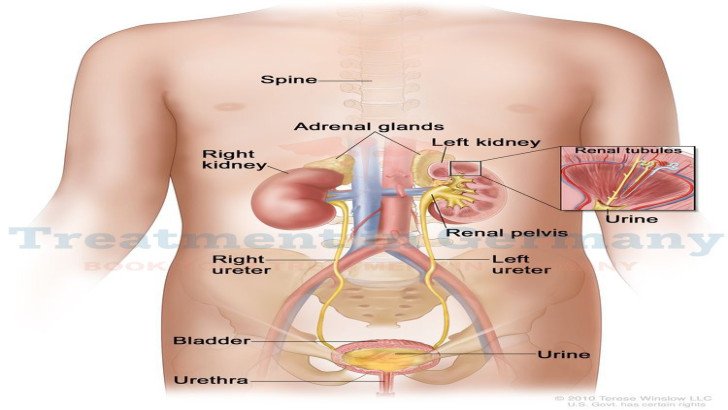
Bladder cancer stage 4 is the most advanced form of the disease, characterized by the spread of cancer cells beyond the bladder to distant lymph nodes, the liver and lungs, and even the bones.
Immunotherapy is reshaping bladder cancer treatment and kidney cancer treatment by harnessing the immune system to target malignant cells with precision. Germany, a global leader in advanced oncology, is at the forefront of therapeutic innovations in 2025, with clinical trials advancing immune checkpoint inhibitors, personalized vaccines, and combination therapies.
Immunotherapy enhances the body’s immune system to recognize and destroy cancer cells, offering a targeted approach for bladder cancer and kidney cancer. Treatments like immune checkpoint inhibitors (e.g., pembrolizumab, nivolumab) block proteins such as PD-1/PD-L1, enabling T cells to attack tumors. Personalized vaccines and adoptive cell therapies like CAR T-cell therapy are also emerging, tailored to patient-specific tumor antigens. German oncology centers lead in clinical trials, integrating immunotherapy with targeted therapies to enhance anti-tumor efficacy and survival rates.
Identifying bladder cancer symptoms and kidney cancer symptoms is critical for selecting candidates for immunotherapy. Common symptoms include:
Bladder Cancer Symptoms:
Kidney Cancer Symptoms:
These symptoms highlight the need for diagnostic precision. German specialists use advanced tools to confirm eligibility for immunotherapy, ensuring effective cancer treatment.
Achieving Diagnostic Precision for Immunotherapy
Diagnostic precision is essential to identify tumor antigens and tailor immunotherapy for bladder and kidney cancer. German oncology centers employ cutting-edge diagnostic tools:
German oncologists ensure rapid, accurate diagnostics, enabling personalized immunotherapy for cancer patients.
What’s New in Bladder and Kidney Cancer Immunotherapy in 2025
Germany’s advanced oncology landscape in 2025 showcases therapeutic innovations in bladder and kidney cancer immunotherapy, driven by clinical trials and combination therapies.
Bladder Cancer Immunotherapy Advancements
Bladder cancer, particularly muscle-invasive bladder cancer (MIBC) and non-muscle-invasive bladder cancer (NMIBC), benefits from several immunotherapy approaches:
Kidney Cancer Immunotherapy Advancements
Kidney cancer, particularly clear cell renal cell carcinoma (ccRCC), is highly immunogenic, making it a prime candidate for immunotherapy:
Integration with Combination Therapies
Both cancers benefit from combination therapies to maximize anti-tumor efficacy:
German oncology centers integrate these strategies to enhance clinical outcomes.
Why Germany Leads in Bladder and Kidney Cancer Immunotherapy
Germany’s leadership in cancer treatment stems from:
Risk Factors and Prevention Strategies
Preventing bladder and kidney cancer recurrence supports immunotherapy. Key risk factors include:
German specialists recommend smoking cessation, regular screenings (CT scans, urinalysis), and healthy lifestyles to reduce disease risk.
Comprehensive Multidisciplinary Cancer Care
Germany’s multidisciplinary cancer care integrates immunotherapy with:
This approach optimizes patient outcomes.
Post-Treatment Support and Enhancing Quality of Life
After immunotherapy, German oncology centers provide:
Germany ensures sustained recovery for cancer patients.
Challenges and Future Directions
Challenges in immunotherapy include tumor immunosuppression and biomarker identification. German researchers address these through:
Future therapeutic innovations include universal neoantigen vaccines and TME-targeted therapies.
Conclusion
In 2025, Germany’s advancements in bladder and kidney cancer immunotherapy are transforming cancer care. Through checkpoint inhibitors, personalized vaccines, and combination therapies, oncology centers achieve robust immune activation, improved survival rates, and enhanced quality of life. Supported by diagnostic precision, multidisciplinary care, and holistic support, Germany offers hope to bladder and kidney cancer patients worldwide.
Frequently Asked Questions
What’s new in bladder and kidney cancer immunotherapy in Germany in 2025?
Checkpoint inhibitors, personalized vaccines, and combination therapies improve survival rates.
What symptoms do these immunotherapies address?
Hematuria, pain, fatigue, and urinary issues.
How is eligibility for immunotherapy determined?
Via NGS, PET-CT, biopsies, and liquid biopsies.
Are clinical trials available in Germany?
Yes, exploring neoantigen vaccines and combination therapies.
Is follow-up care provided?
Yes, including monitoring, rehabilitation, and emotional wellness.
How does Germany compare to the UK/US?
Germany leads in therapeutic innovations and rapid access.
Can immunotherapy prevent recurrence?
It induces immunological memory to delay recurrence.
Does Germany support international patients?
Yes, with language assistance and travel coordination.
What are the latest advancements?
AI-driven biomarkers, CAR T-cell therapy, and ADCs.
How does immunotherapy differ from traditional treatments?
It uses personalized immunotherapy to target tumor antigens, unlike chemotherapy.
For more information or a free consultation, visit our contact us page.
Kindly complete the form below, and our dedicated team will reach out to you promptly. We look forward to connecting with you soon!
Trierer Straße, 56072 Koblenz, Germany

.webp)
 (1).webp)

.webp)
 (1).webp)


.webp)
 (1).webp)

.webp)
 (1).webp)
